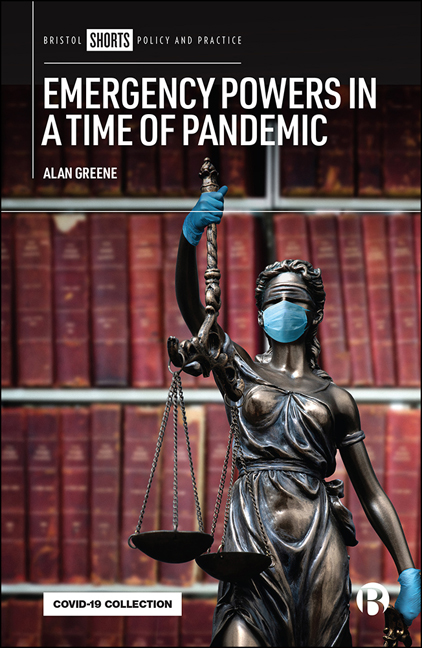Book contents
- Frontmatter
- Contents
- Notes on the Author
- Acknowledgements
- Introduction
- One The Pandemic State of Emergency
- Two Pandemics and Human Rights: Non-Derogable Rights
- Three Pandemics and Human Rights: Derogable Rights
- Four Pandemics and Democracy
- Five The End of the Pandemic Emergency
- Six Conclusions: Breathing Space
- Index
Three - Pandemics and Human Rights: Derogable Rights
Published online by Cambridge University Press: 12 March 2021
- Frontmatter
- Contents
- Notes on the Author
- Acknowledgements
- Introduction
- One The Pandemic State of Emergency
- Two Pandemics and Human Rights: Non-Derogable Rights
- Three Pandemics and Human Rights: Derogable Rights
- Four Pandemics and Democracy
- Five The End of the Pandemic Emergency
- Six Conclusions: Breathing Space
- Index
Summary
Introduction
While a declaration of a state of emergency should not affect non-derogable rights, not all rights fall into this category. Rights that can be derogated from allow a state to enact measures not ordinarily permissible under the parameters of the treaty in question. The same is true of constitutional emergency powers that expressly label rights as derogable or not non-derogable. However, these rights can also be interfered with by the state without the declaration of an emergency. This raises the question of whether pandemic powers should be accommodated under the ordinary or normal grounds of legitimate interference built into these rights, or whether a state of emergency should be declared in order to enact these measures. Again, I want to emphasize what ought to happen, rather than what is likely to happen. Ultimately, I contend that human rights overall are better protected when emergency powers are quarantined to exceptional situations, and the best approach to do this is through a de jure declaration of a state of emergency.
To demonstrate this, this chapter looks at the case law of the ECtHR as an illustrative example of the challenges that so-called ‘lockdowns’ pose to derogable rights. First, a brief outline of the concept of ‘lockdown’ is discussed. Then, I will focus on the impact that lockdown has on what are termed ‘limited rights’ – rights that can be interfered with only in discrete circumstances. Emphasis is put on Article 5 ECHR – the right to liberty – and whether this right is best protected with or without derogation. Following this, I then look at qualified rights – rights that can be interfered with normally under broadly defined circumstances. Again, a key theme is the quarantining effects of a de jure declared emergency, Moreover, while this chapter focuses on the EHCR; the similarities between this Convention and other international human rights treaties means that many of the arguments in this chapter can be mapped on to other states that are not a party to the Convention. Likewise, the questions raised before the ECHR on these issues are similar to those raised before domestic courts concerning constitutional interpretation.
- Type
- Chapter
- Information
- Emergency Powers in a Time of Pandemic , pp. 61 - 92Publisher: Bristol University PressPrint publication year: 2020



